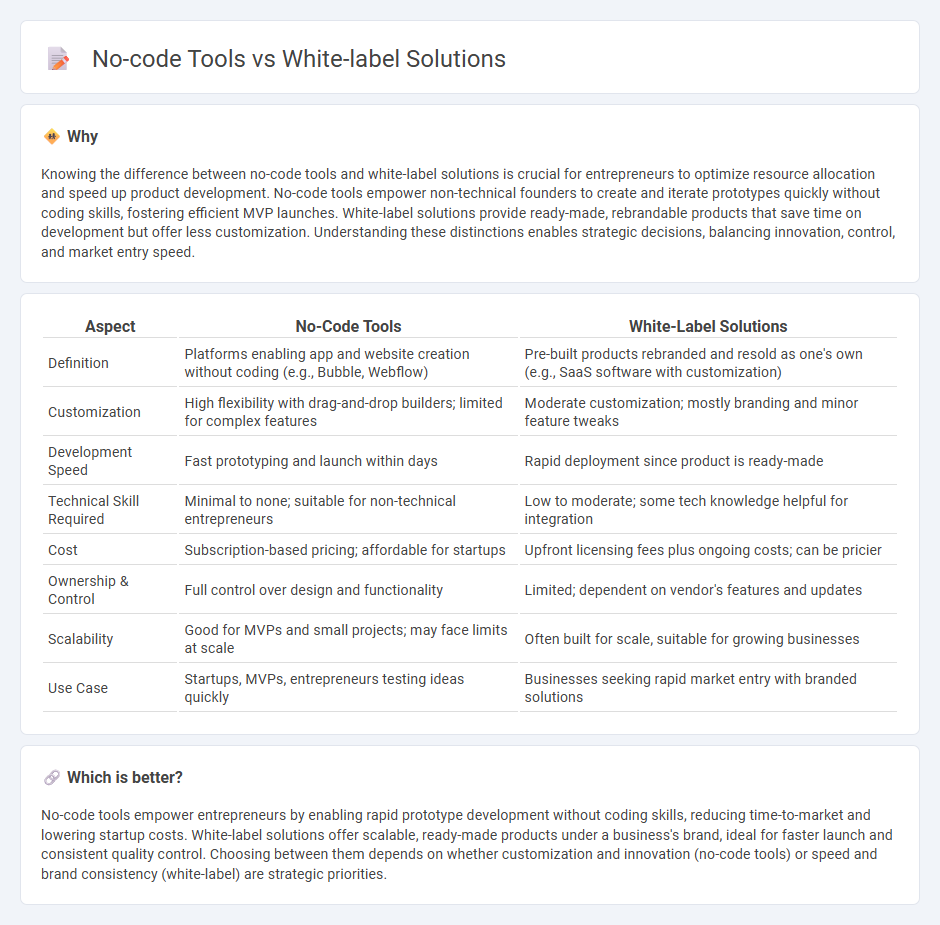
No-code tools empower entrepreneurs to build and customize software applications without writing code, accelerating product development and reducing costs. White-label solutions offer ready-made platforms that entrepreneurs can brand as their own, streamlining market entry with proven technology. Explore how these options can transform your business strategy and growth potential.
Why it is important
Knowing the difference between no-code tools and white-label solutions is crucial for entrepreneurs to optimize resource allocation and speed up product development. No-code tools empower non-technical founders to create and iterate prototypes quickly without coding skills, fostering efficient MVP launches. White-label solutions provide ready-made, rebrandable products that save time on development but offer less customization. Understanding these distinctions enables strategic decisions, balancing innovation, control, and market entry speed.
Comparison Table
| Aspect | No-Code Tools | White-Label Solutions |
|---|---|---|
| Definition | Platforms enabling app and website creation without coding (e.g., Bubble, Webflow) | Pre-built products rebranded and resold as one's own (e.g., SaaS software with customization) |
| Customization | High flexibility with drag-and-drop builders; limited for complex features | Moderate customization; mostly branding and minor feature tweaks |
| Development Speed | Fast prototyping and launch within days | Rapid deployment since product is ready-made |
| Technical Skill Required | Minimal to none; suitable for non-technical entrepreneurs | Low to moderate; some tech knowledge helpful for integration |
| Cost | Subscription-based pricing; affordable for startups | Upfront licensing fees plus ongoing costs; can be pricier |
| Ownership & Control | Full control over design and functionality | Limited; dependent on vendor's features and updates |
| Scalability | Good for MVPs and small projects; may face limits at scale | Often built for scale, suitable for growing businesses |
| Use Case | Startups, MVPs, entrepreneurs testing ideas quickly | Businesses seeking rapid market entry with branded solutions |
Which is better?
No-code tools empower entrepreneurs by enabling rapid prototype development without coding skills, reducing time-to-market and lowering startup costs. White-label solutions offer scalable, ready-made products under a business's brand, ideal for faster launch and consistent quality control. Choosing between them depends on whether customization and innovation (no-code tools) or speed and brand consistency (white-label) are strategic priorities.
Connection
No-code tools empower entrepreneurs to build and customize digital products rapidly without extensive programming skills, accelerating startup development. White-label solutions complement this by providing pre-built, customizable products that entrepreneurs can brand and market as their own, reducing time-to-market. Together, these technologies streamline business creation and enable scalable, cost-effective innovation.
Key Terms
Customization
White-label solutions offer extensive customization options, enabling businesses to tailor branding, features, and user experience to fit their unique needs, while no-code tools provide more limited but user-friendly customization through pre-built templates and drag-and-drop interfaces. Companies aiming for deep branding integration often prefer white-label solutions due to their flexibility in modifying core functionalities without extensive coding. Explore the nuances of customization and make an informed decision by learning more about white-label and no-code tool capabilities.
Scalability
White-label solutions offer robust scalability by allowing businesses to customize and rebrand existing platforms, accommodating growing user demands without extensive development. No-code tools provide rapid deployment and easy modifications but may face performance limitations as complex features scale. Explore how each option impacts your business growth and technical flexibility.
Technical Expertise
White-label solutions require significant technical expertise for customization, integration, and ongoing maintenance, making them suitable for businesses with dedicated development teams. In contrast, no-code tools enable users with minimal technical skills to build and deploy applications through drag-and-drop interfaces, reducing time-to-market and development costs. Discover how each approach fits your technical capabilities and business goals by exploring detailed comparisons.
Source and External Links
What is a White-Label Solution, and What are its Benefits? - Dorik - A white-label solution is a pre-built product or service created by one company that can be rebranded and sold by another, offering cost-effectiveness, fast implementation, customizability, access to expertise, scalability, and less risk compared to building from scratch.
How using white label solutions can benefit your business - White-label solutions provide a proven, less risky approach to expanding product offerings, allowing resellers to scale their business efficiently while customizing to meet customers' needs.
White-Label Meaning for Business Success - Teqblaze - White-label solutions let brands launch unique, fully branded products or services quickly without reinventing the wheel, enabling fast market entry and brand reinforcement through customizable, ready-made software.
 dowidth.com
dowidth.com